最新上海中考英语各语法点基础考点归纳
上海中考英语必考基础知识点自检(纯知识点)
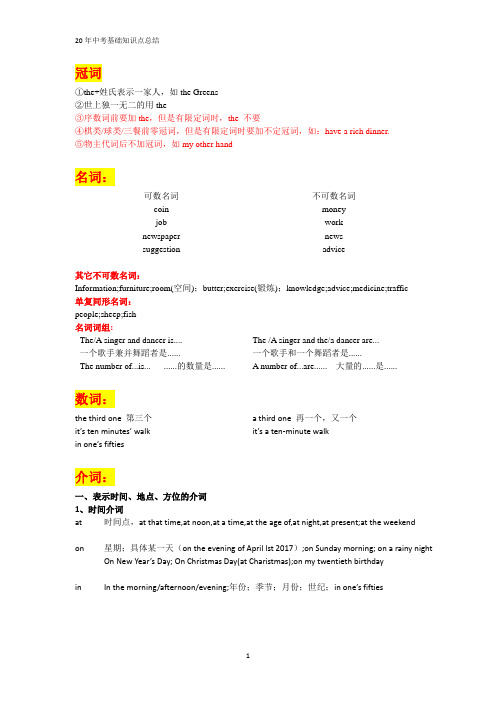
冠词①the+姓氏表示一家人,如the Greens②世上独一无二的用the③序数词前要加the,但是有限定词时,the 不要④棋类/球类/三餐前零冠词,但是有限定词时要加不定冠词,如:have a rich dinner.⑤物主代词后不加冠词,如my other hand名词:可数名词不可数名词coin moneyjob worknewspaper newssuggestion advice其它不可数名词:Information;furniture;room(空间);butter;exercise(锻炼);knowledge;advice;medicine;traffic 单复同形名词:people;sheep;fish名词词组:The/A singer and dancer is.... 一个歌手兼并舞蹈者是...... The /A singer and the/a dancer are... 一个歌手和一个舞蹈者是......The number of...is... ......的数量是...... A number of...are...... 大量的......是......数词:the third one 第三个 a third one 再一个,又一个it’s ten minutes’ walk it’s a ten-minute walkin one’s fifties介词:一、表示时间、地点、方位的介词1、时间介词at 时间点,at that time,at noon,at a time,at the age of,at night,at present;at the weekendon 星期;具体某一天(on the evening of April lst 2017);on Sunday morning; on a rainy night On New Year’s Day; On Christmas Day(at Charistmas);on my twentieth birthdayin In the morning/afternoon/evening;年份;季节;月份;世纪;in one’s fifties2、表示地点at 小地点;at the station; at the cinema;at the airport; at the corner of...in 大地点;内部;in the forest; in space;in the worldon 岛屿;在...上方(有接触面);on Chongming Island; on the wall; on one’s way;on the third floor其它over the head(正上方) under the tree(正下方)above the head(不是正上方) below the hill (不是正上方)along the river around the lake二、between(两者)/among(三者或以上)在......之间三、after/in表示在......之后的用法单词用法举例After ①after+时间段:表示过去某一时刻为起点的一段时间之后,用于过去式②after doing sth:表示做完某事之后,可用于将来时He came back after two days.He will go home after finishing the workin in+时间段:表示以现在为起点的将来一段时间之后,用于将来时He will come back in two days.四、with/by/in 表示“用......”单词用法举例With 表示“用......”,一般指有形的工具/手段/人体器官注意:with 还表示伴随,“带有,含有”He cut the apple into halves with a knife.He came in with a big smile on his face.in 表示用某种语言,方式,途径,或书写/绘画的材料也可以表示交通工具Can you say in English?He wrote a letter in blue ink.I came here in a car.by 表示乘坐交通工具,表示方式、方法He makes a living by sellingthings.同意词①by phone=on the phone ②by car=in a car③in pen=with a pen=with pens ④by bus=on a bus情态动词形容词和副词一、形容词以ly结尾的形容词lonely,friendly,lively,lovely,likely二、形容词副词同形的词ahead;early;fast;hard;high;later;straight.三、与fun、funny有关的短语It is great fun to do sthWhat great fun it is ...How funny it is...四、比较级2)下列单词只能加more/mostreal;tired;pleased;often;like(相似的)词组搭配动词易混词组辨析out系列find out look outturn out set out/set off pick out Carry outgo out put outtake out Work out Break outover 系列all over look overgo over turn over Think overOff 系列put off show offtake off Keep offGet off See...offTurn offUp 系列dress up give upgrow up look upput up take upshut up stay upturn up (反)turn down Wake up Cheer upon 系列put on rely onturn on try onWork on focus onFor 系列look for care forstand foraroundshow sb aroundaway系列take away T=throw awayDownPut down look downturn down Cool/calm down take downWithdeal with Compete with其他as long as as soon asin fact on averagenow that in additionat once at a timefor the first time run out ofin brief even in/even though all the time for a whiletake placeAafter all according toas a result agree with sb above all agree on sthall in all agree to doas well as well asask for at presentat workBbe based on... be careful with be connected to/with be fond ofbe /get familiar to be crazy aboutbe keen onbe/get familiar with be covered with be located in/on/atbe made of be made up of be made from be made into be pleased with big dealbe strict with break down break into by the wayCcare for change one’s mind come to an end consist ofcut down Check inDdepend on die ofdo sb a favor die fromdecide to doFfor the time being from time to time fill in far awayGget on/along with get rid ofgive up go aheadgo in for go on a picnic go on with/doing sth go wrongHhappen to sb have no idea have a pity on hear ofhear and there hear fromhold onIIn this way In returnIn favor of in returnJJump to a conclusion =jump to conclusionsKKeep ......from...... Keep offLlay the table leave forlive on lose temperOon business on the phone on holiday on one’s side out of date over and overPPrevent from Protect ......from Stop ...fromRRefer to ...代词一、ItIt is+adj.+to do sthIt seems that +从句It’s one’s turn to do sthIt’s time to do sth/for sthIt’s +adj.+that +从句make/find/feel/consider it+adj./n. (for sb) to do sth二、few、little 系列quite/still/only/just a few/a littlequite a few=still a few=manyquite a little=still a little=muchonly/just a few=fewonly/just a little=little三、both/either/neither/all/none/any系列补充:谓语动词四、another/other/the other/others/the others 的区别Another 三者中一个the other 两者中另外一个Others=other +名词复数the others=the other+名词复数The others 剩余所有的others 其它的the othersSomeSome others非谓语动词谓语动词(备注:只写时间状语)注意:①has been to/have gone to /have been in的区别②瞬间动词和延续性动词的转换被动态Make/let/have/see/hear/feel/watch sb do 用于被动态时,to要还原其他:强调做题顺序,即单三和时态问题感叹句备注:强调做题方法宾语从句反义疑问句一、原则1.前肯后否,前否侯肯2.前名后代3.时态一致二、初中阶段表示否定的词Seldom;hardly;never;no;not;none;nothing;nobody;hardly;rarely;few;little三、其他特殊的附加疑问句1)I am...,aren’t I?2)反义疑问句中有反义词的句子,仍看做肯定形式;He is unhappy,isn’t he?3)Let’s...,shall we?4)Let us...,will you?,祈使句也如此5)表示推测的情态动词的附加疑问句,其附加疑问句俞情态动词后的动词一。
上海初中英语语法知识汇总
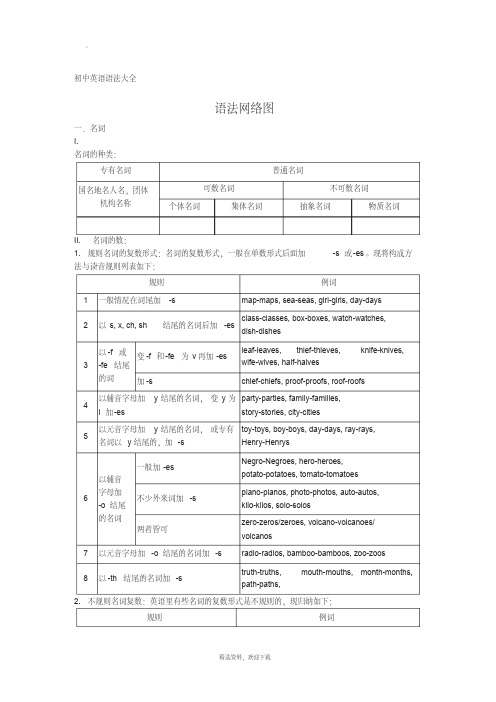
初中英语语法大全语法网络图一.名词I.名词的种类:专有名词普通名词国名地名人名,团体机构名称可数名词不可数名词个体名词集体名词抽象名词物质名词II.名词的数:1.规则名词的复数形式:名词的复数形式,一般在单数形式后面加-s或-es。
现将构成方法与读音规则列表如下:规则例词1一般情况在词尾加-s map-maps, sea-seas, girl-girls, day-days2以s, x, ch, sh结尾的名词后加-es class-classes, box-boxes, watch-watches, dish-dishes3以-f或-fe结尾的词变-f和-fe为v再加-esleaf-leaves,thief-thieves,knife-knives,wife-wives, half-halves加-s chief-chiefs, proof-proofs, roof-roofs4以辅音字母加y结尾的名词,变y为i加-esparty-parties, family-families,story-stories, city-cities5以元音字母加y结尾的名词,或专有名词以y结尾的,加-stoy-toys, boy-boys, day-days, ray-rays,Henry-Henrys6以辅音字母加-o结尾的名词一般加-esNegro-Negroes, hero-heroes,potato-potatoes, tomato-tomatoes 不少外来词加-spiano-pianos, photo-photos, auto-autos,kilo-kilos, solo-solos两者皆可zero-zeros/zeroes, volcano-volcanoes/volcanos7以元音字母加-o结尾的名词加-s radio-radios, bamboo-bamboos, zoo-zoos8以-th结尾的名词加-s truth-truths,mouth-mouths,month-months, path-paths,2.不规则名词复数:英语里有些名词的复数形式是不规则的,现归纳如下:规则例词1改变名词中的元音字母或其他形式man-men, woman-women, foot-feet, goose-geese, mouse-mice2单复数相同sheep,deer,means,works,fish,yuan,jin, 3只有复数形式trousers,clothes,thanks,goods,glasses, 4一些集体名词总是用作复数people, police5部分集体名词既可以作单数(整体)也可以作复数(成员)class, family, crowd, couple, group,government,population,team,public,party6复数形式表示特别含义customs(海关),times(时代),spirits(情绪), drinks(饮料), sands(沙滩), papers(文件报纸), looks(外表), brains(头脑智力), greens(青菜)7表示“某国人”加-sAmericans, Australians, Germans, Greeks,Swedes, Europeans单复数同形Swiss, Portuguese, Chinese, Japanese以-man或-woman结尾的改为-men,-womenEnglishmen, Frenchwomen8合成名词将主体名词变为复数sons-in-law, lookers-on, passers-by,story-tellers, boy friends无主体名词时将最后一部分变为复数grown-ups, housewives, stopwatches 将两部分变为复数women singers, men servantsIII.名词的所有格:名词在句中表示所有关系的语法形式叫做名词所有格。
上海重点初中英语语言点及语法总结归纳
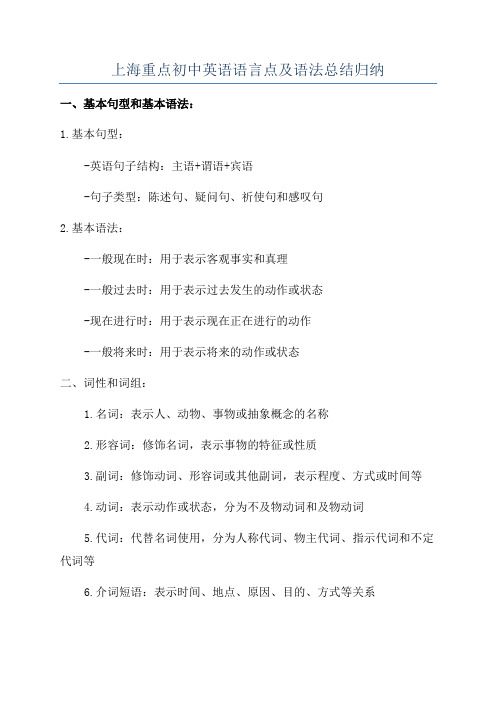
上海重点初中英语语言点及语法总结归纳一、基本句型和基本语法:1.基本句型:-英语句子结构:主语+谓语+宾语-句子类型:陈述句、疑问句、祈使句和感叹句2.基本语法:-一般现在时:用于表示客观事实和真理-一般过去时:用于表示过去发生的动作或状态-现在进行时:用于表示现在正在进行的动作-一般将来时:用于表示将来的动作或状态二、词性和词组:1.名词:表示人、动物、事物或抽象概念的名称2.形容词:修饰名词,表示事物的特征或性质3.副词:修饰动词、形容词或其他副词,表示程度、方式或时间等4.动词:表示动作或状态,分为不及物动词和及物动词5.代词:代替名词使用,分为人称代词、物主代词、指示代词和不定代词等6.介词短语:表示时间、地点、原因、目的、方式等关系7. 固定短语:常用的固定搭配,如"look forward to"、"take place"等三、语法:1.一般现在时的用法:- 表示客观事实和真理,如"The sun rises in the east."- 表示经常、频率或习惯性的动作,如"I usually go to bed at 10 o'clock."- 表示通用真理,如"Water boils at 100 degrees Celsius."- 表示感觉、态度或观点,如"I like reading books."2.一般过去时的用法:- 表示过去具体的动作或状态,如"I played football yesterday."- 表示过去的习惯动作,如"Every day, he went to school by bus."- 表示过去的经常性动作,如"We often visited our grandparents on weekends."3.现在进行时的用法:- 表示现在正在进行或发生的动作,如"She is watching TV now."- 表示将来的安排或计划,如"I am meeting my friends this afternoon."- 表示不断重复的动作,如"He is always talking in class."4.一般将来时的用法:- 表示将来即将发生或计划中的动作,如"We will go shopping tomorrow."-表示将来的打算或意愿- 表示将来的预测或推测,如"It will rain tomorrow."5. 过去进行时的用法:表示过去一些时间正在进行的动作或事情,如"She was reading a book yesterday evening."总结:以上是对上海(牛津版)初中英语教材的重点语言点和语法进行的总结归纳。
2023年上海中考英语热点重难点专练重难点17 句型转换解题技巧(原卷版)
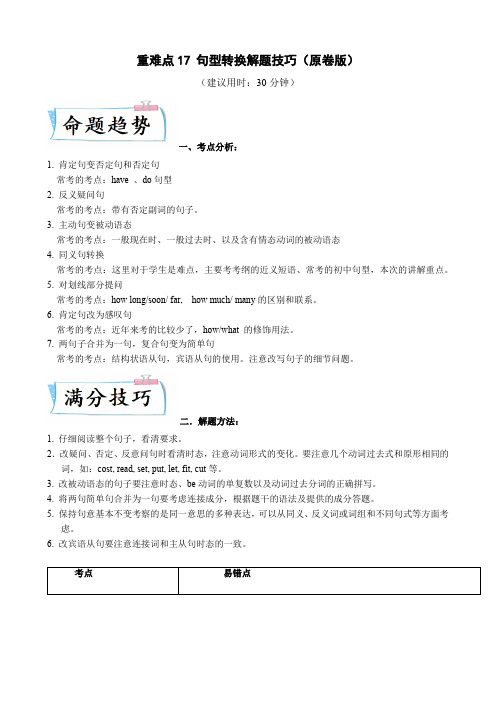
重难点17 句型转换解题技巧(原卷版)(建议用时:30分钟)一、考点分析:1. 肯定句变否定句和否定句常考的考点:have 、do句型2. 反义疑问句常考的考点:带有否定副词的句子。
3. 主动句变被动语态常考的考点:一般现在时、一般过去时、以及含有情态动词的被动语态4. 同义句转换常考的考点:这里对于学生是难点,主要考考纲的近义短语、常考的初中句型,本次的讲解重点。
5. 对划线部分提问常考的考点:how long/soon/ far, how much/ many的区别和联系。
6. 肯定句改为感叹句常考的考点:近年来考的比较少了,how/what 的修饰用法。
7. 两句子合并为一句,复合句变为简单句常考的考点:结构状语从句,宾语从句的使用。
注意改写句子的细节问题。
二.解题方法:1. 仔细阅读整个句子,看清要求。
2.改疑问、否定、反意问句时看清时态,注意动词形式的变化。
要注意几个动词过去式和原形相同的词,如:cost, read, set, put, let, fit, cut等。
3. 改被动语态的句子要注意时态、be动词的单复数以及动词过去分词的正确拼写。
4. 将两句简单句合并为一句要考虑连接成分,根据题干的语法及提供的成分答题。
5. 保持句意基本不变考察的是同一意思的多种表达,可以从同义、反义词或词组和不同句式等方面考虑。
6. 改宾语从句要注意连接词和主从句时态的一致。
一、划线部分提问1.The boy apologized to the woman for breaking the window.(对划线部分提问)_________ _________ the boy apologize to the woman?2.Many people prefer to drive electric cars to protect the environment.(对划线部分提问)________ ________ many people prefer to drive electric cars?3.The performances will be on in five days.(就划线部分提问)________ ________will the performances be on?4.James cut his birthday cake into smaller pieces to have more people enjoy it.(对划线部分提问)________ James cut his birthday cake for?5.The captain ordered the soldier to pull the wooden horse into the city.(划线提问)________ did the captain order the soldier to ________?6.To add variety, some frames in comic strips are left without borders.(对划线部分提问)________ ________ some frames in comic strips left without borders?二、同义句转化7.Jason happened to meet his class teacher when he walked to the park. (保持句意基本不变)Jason happened to meet his class teacher when he went to the park ________ ________.8.It has been a long time since I received a letter from my cousin in France.(保持句意不变)It has been a long time since I _________ _________ my cousin in France.9.Australia doesn’t have as many people as China.(保持原句意思不变)Australia ________ ________ people than China does.10.The bus driver should take charge of all the passengers’ safety.(保持句意基本不变)The bus driver should be ________ all the passengers’ safety.11.Alice visits her grandparents in the countryside from time to time. (保持句意基本不变)Alice visits her grandparents in the countryside ________ and ________.12.Miss Chen talked about the main idea of the passage in the last class.(保持句意基本不变)Miss Chen ________ the main idea of the passage in the last class.13.He managed to find the key in the end.(保持句意基本不变)He ________ ________ in finding his key in the end.14.Tina managed to create her first comic strips without any help.(保持句意基本不变)Tina ____ creating her first comic strips without any help.15.The weather affected our plans. (改为同义句)The weather had an ________ ________ our plans.16.The Olympic Games take place in an important city once every four years. (保持句意基本不变)The Olympic Games ________ in an important city once every four years.17.The big house cost the Smiths one million dollars. (保持句意不变)The Smiths ________ the big house one ________ million dollars.18.Linda kept practicing so that she could remember all the lines in the play. (保持基本句意不变)Linda kept practicing ________ ________ to remember all the lines in the play.三、改写句子19.We can’t throw the used batteries away. We should collect them for special treatment.(两句合并成一句)We should collect the used batteries for special treatment ________ ________ throwing them away. 20.Jane’s parents rarely buy him name-brand sports shoes. (改为反意疑问句)Jane’s parents rarely buy him name-brand sports shoes, ________ ________?21.Kitty wondered where she would meet her friends on Sunday morning.(改为简单句)Kitty wondered ________ meet her friends on Sunday morning.22.Mr. Smith taught the students Physics last term.(改为否定句)Mr Smith ________ the students Physics last term.23.A terrible natural disaster struck the fishing villages near the Pacific Ocean. (改为被动语态)The fishing villages near the Pacific Ocean ________ by a terrible natural disaster.24.Has he caught the flight? Could you please tell me? (改为宾语从句)Could you please tell me ________ caught the flight?25.Will we have an autumn outing next week? Please tell me.(合并为一句)Please tell me ________ we ________ have an autumn outing next week.四、将所给单词连成句子26.make a living, cormorants, fishermen, with the help of (连词成句)________________________________________________.27.next, his students, to do, is showing, what, Professor White(连词成句)________________________________________________________________________. 28.can’t, a foreign language, to learn, in a short time, anyone, expect(连词成句)_____________________________.29.in advance, to check, are expected, a few days, online, the information, you(连词成句)__________________________________________________ .30.the cause of the disease, have done, the scientists, to find out, many experiments(连词成句)_________________________________________________________________.。
上海中考英语必考语法点梳理

上海中考英语必考语法点梳理⼀. 宾语从句1. 宾语从句的含义在整个句⼦中做宾语的从句叫做宾语从句。
如:She knew that the teacher had seen the film.她知道这位⽼师看过这部电影。
(“that the teacher had seen the film”做knew 的宾语,同时⼜是由连接词that 引导的从句,所以它叫做宾语从句。
)2. 宾语从句的分类(1)动词宾语从句:顾名思义,它是位于动词后⾯的宾语从句。
例如:He asked whose handwriting was the best in our class.他问我们班上谁的书法最好。
(2)介词宾语从句:顾名思义,它是位于介词后⾯的宾语从句。
例如:I agree with what you said just now.我同意你刚才说的话。
(3)形容词宾语从句:顾名思义,它是位于形容词后⾯的宾语从句。
例如:I am afraid that I will be late. 恐怕我要迟到了。
3. 引导名词性从句的连接词(1)that:没有含义,在宾语从句中不做成分(2)whether/if:表⽰是否,在宾语从句中不做成分。
I don't know if /whether he still lives here after so many years. 我不知道这么多年后,他是否还住在这⾥。
(3)连接代词:what, which, who, whom, whose(在宾语从句中做主、宾、表和定语)连接副词:where, when, how, why(在宾语从句中做状语)The small children don't know what is in their stockings.(what 在宾语从句中做主语)这些⼩孩⼦不知道什么在他们的长筒袜⾥。
Could you tell me why you were late for the meeting this morning?(why 在宾语从句中做原因状语)你能告诉我为什么你今天早上开会迟到吗?4. 在做宾语从句的题⽬时应注意两点(1)时态①当主句是现在时态时,宾语从句可以根据需要使⽤任何时态。
上海市初中英语语法和知识点

上海市初中英语语法和知识点上海市初中英语语法和知识点:介词的主要用法介词是一种虚词,不能独立使用。
介词之后一般有名词或代词(宾格)或相当于名词的其他词类、短语或从句作它的宾语,即构成介词短语。
有些介词是由两个以上的词构成的短语介词,如:out of(从…中出来), because of(因为), away from(距离…), on top of(在…顶上), ever since(自从…), next to(在…隔壁), according to(根据…), in front of(在…前方)等。
上海市初中英语语法和知识点:介词的分类地点(位置、范围)介词:above在…前, about在…附近, across在…对面, after在…后面, against倚着..., along在…近旁, among在…中间, around 在…周围, round在….周围, at在…处, before在...前, behind在...后, below低于..., beside在...旁边, between在...之间, by在...旁, down在...下面, from来自..., in在...里面, inside在...里面, near靠近..., of在...之中, on在...上面, out of在...之外, outside在....外面, over在....上方, under在...下方, up在...上面, on top of在...顶部, in front of在...前, close to靠近..., in the middle of在...的中间, at the end of在...的末端,等等。
方向(目标趋向)介词:across横越..., against对抗..., along沿着..., around绕着..., round环绕..., at朝着..., behind向…后面, etween…and…从…到...,by路过/通过..., down向…下, for向..., from从/离..., in进入..., into进入..., inside到...里面, near接近..., off脱离/除..., on 向...上, out of向...外, outside向....外, over跨过..., past经过/超过...,through穿过..., to向/朝..., towards朝着..., on to到...上面, onto到...上面, up向...上, away from远离...时间介词:about大约..., after在…以后, at在… (时刻), before在…以前, by到…为止, during在…期间, for有…(之久), from从…(时)起, in 在(上/下午);在(多久)以后, on在(某日), past过了…(时), since自从…(至今), through 贯穿…(期间), till直到…时, until直到…时, to到(下一时刻), ever since从那时起至今,at the beginning of在...开始时 ,at the end of在...末 , in the middle of在...当中 ,at the time of在...时方式介词:as作为/当作..., by用/由/乘坐/被..., in用…(语言), like 与…一样, on骑(车)/徒(步),通过(收音机/电视机), over通过(收音机), through通过..., with用(材料),用(手/脚/耳/眼), without没有…涉及介词: about关于..., except除了…, besides除了…还... for对于/就…而言, in在…(方面), of…的,有关..., on关于/有关..., to对…而言, towards针对..., with就…而言其它介词:【目的介词】 for为了..., from防止…, to为了…【原因介词】 for因为..., with由于…, because of因为...【比较介词】 as与…一样,like象…一样,than比...,to与…相比, unlike 与…不同【伴随/状态介词】 against和…一起(比赛),at在(上班/休息/上学/家,etc.),in穿着…(衣服/颜色),into变成...,on在(值日), with与…一起,有/带着/长着..., without没有/无/不与…一起上海市初中英语语法和知识点:介词短语的句法作用介词短语相当于一个形容词或副词,可用作状语、定语和表语。
最新上海中考英语语法重点整理

欢迎来主页下载---精品文档中考语法整理be busy doing sth.例题:Look! This new couple are busy ________ their new flat.A. decoratingB. to decorateC. decoratesD. decorate2.tell sb to do sth.例题:He told Laura to take care of _________ . Do'be too busy.A. sheB. herC. hersD. herself例题:Father often tells Tom ___________ too much time playing video games.A) don't spend B) to not spend C) not to spend D)doesn't spend3.keep/make sth. + adj.例题The head teacher asked all the students to help keep the school ______ ..A. cleanly B. clean C. clear D. clearly例题Let's do something together to keep our Earth __________ . (save)4. find it + adj. to do sth.例题The old man at th6 bus stop found it difficult for him to __________ the crowded bus.A) get up B) get on C) get off D) get along5. It is + adj. for sb. to do sth.It is important for us to __________ our friendship. (strong)It's __________ for a boy of four to work out such a difficult problem. (possible)6. so …that …The girl was so __________ that she hid herself behind the door. (frighten)7. some…..some 句型一些。
上海中考英语语法
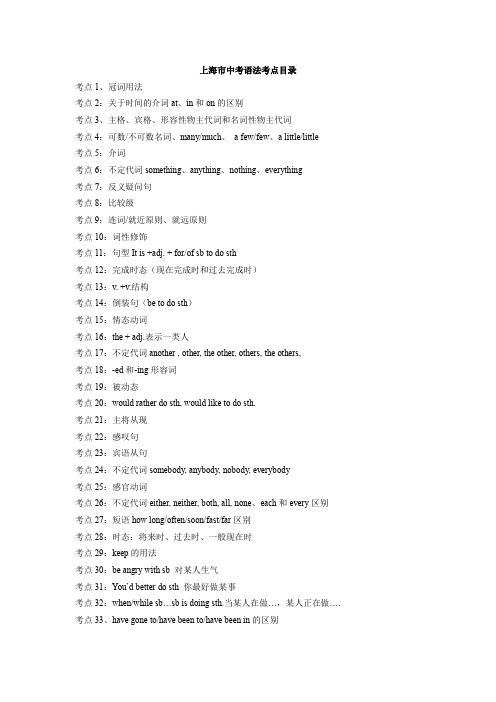
Ⅲ、反身代词作同位语,以加强语气,如:
I saw the girl herself. 我看到那个女孩子本人了。
Ⅳ、反身代词作表语,表示身体“正常”,如:
She is not quite herself today. 她今天不舒服。
Ⅴ、by oneself 独立,靠自己
例题:
1、I’m afraid all of you have to work out the problem by _______.
My idea is quite different from hers. = My idea is quite different from her idea. 我的观点和她的不一样。 (4)、名词性物主代词可用在 of 后面构成 of 短语,在句子中作定语,相当于“of+名词所有 格”,表示部分概念或者有一定的感情色彩。 He is a friend of mine. 他是我的一个朋友。 例题:
1、Our school sports meeting is usually held _______ November.
A. at
B. for
C. on
D. inቤተ መጻሕፍቲ ባይዱ
2、It is reported that a powerful typhoon hit the Philippines ________ November, 2013
1、I don’t think this is Diana’s pet dog. _______ is dark brown.
A. She
B. Her
C. Hers
D. Herself
2、The cinema in our neighborhood is old and small, but ________ is big and modern.
- 1、下载文档前请自行甄别文档内容的完整性,平台不提供额外的编辑、内容补充、找答案等附加服务。
- 2、"仅部分预览"的文档,不可在线预览部分如存在完整性等问题,可反馈申请退款(可完整预览的文档不适用该条件!)。
- 3、如文档侵犯您的权益,请联系客服反馈,我们会尽快为您处理(人工客服工作时间:9:00-18:30)。
冠词一、固定词组1. 有些固定词组中有the : in the middle of, go to the cinema/ movies, play the violin/ piano/ guitar, in the end, the same2. 有些词组中不用任何冠词:by bus, play football, play chess, go to school, go to bed, at first, lose weight3. 有些词组中加a: catch a bus, in a hurry, take a walk,二、专有名词前1.国家、城市等专有名词前不加the : Shanghai, in New York, in America,但是the United Sates 要加the2. 由普通名词构成的专有名词前加the Great Wall,3. 江河、海洋、山川前加the: the Yangtze River, the Pacific, the Yellow Mountains 三.一日三餐、四季、一星期七天及十二个月,next前不加任何冠词1. for breakfast/lunch/supper2. in spring/ summer /autumn /winter3.on Monday /Tuesday /Wednesday /Thursday /Friday /Saturday / Sunday4.inJanuary,February,March,April,May,June,July,August,September,October,November,De cember四、宇宙中独一无二的事物,序数词,形容词最高级,only所修饰的名词前用the1. the sun, the moon, the earth2. the eighth, the twelfth, the twentieth, the fourth3. the biggest, the most popular4. the only key五、形容词加the, 表示这一类人the blind, the deaf, the old, the rich, the poor六、单词前面用“an”还是“a”取决于单词开头的读音是否是原音1. a: a useful dictionary, a university student, a European village, a one-eyed captain, a uniform2. an: an hour, an honest girl, an e-mail, an important letter, an exchange student, an unclean X-ray photograph, an MBA course,There is __an __”f” in the word “first”. ( f, h, l, m, n, s, x, r, )介词分类记忆:一、时间介词具体哪一天on, 几点钟前用at, 年、月份前用in, 早上、下午、晚上用in, 但是具体某一天的早上、下午、晚上用on。
last, next, this, that, some, every等词之前一律不用介词On Christmas Day, on December 14, 2013, on the morning of December 15,二、地点介词三、短语中固定搭配的介词care for, based on, in one’s thirties, concentrate on=focus on , the answer to the question, the key to the door, She is of average height, share with, be responsible for, add…to,四、方式介词by,withby bus, by train , by e-mail, by express mail, by credit cardwrite with a pen, say it in English五、表示形容词、副词比较范围的of/ among + 代词,名词或数词,in+ 表示地点或集体的名词John was the first on the list of the famous stars because he was the richest ______ them.代词一、人称代词1.顺序:单数:二、三、一复数:一、二、三John sits among ______, _______ and me.A. Mary…youB. she…youC. you…MaryD. you…she2.主格宾格:主格——主语,宾格——宾语(动词或介词后)The journalist interviewed ________. (he, his, him)I show_______ around the city. (they, their, them)3. 名词性物主代词The cinema in our neighborhood is old and small, but ______ is big and modern.(they, them,. their, theirs)Mum, have you ever seen Danny’s sports shoes? I want a pair like _______. (he)a friend of mine/ his/ my father’sI ______ we______ you_______ he_______ her________ they_______4、反身代词enjoy oneself , help oneself to sth, learn…by oneself= teach oneselfI made it myself.I ______ we______ you_______ he_______ her________ they_______ it________不定代词1.the other, others, another, the othersSome…._______ One…_________another + 可数名词的单数固定词组一个接着一个_________________Will you please show me _________ one?Have _______ try, and you’ll succeed.2.形容词修饰不定代词、形容词后置something necessary3.either_______, neither______, both______, all_______, none________The report says __________ of the two countries in Asia supports the war.After you get off the bus, you can take ________ of the two Metro Lines to Zhongshan Park.either side both sides4.few, a few, little, a littleIt’s unusual for him to be so active because he is often a boy of _______ words.A. fewB. littleC. manyD. much数词1、two hundred/ thousand, hundreds/thousands of , 前面如果有more than, less than , over, about 等词时,用确切的数据about/ more than two hundred people2、数字的读法,百位和十位之间用and 3653、序数词的拼写One_______ , two__________, three_________ Four________, five________, eight_________, twelve________, nine_______, twenty_________, twenty-one_____________5.分数1/2____________ 2/3__________, 3/ 4_________, 3/5_________6、百分比30 percent7、日期表达February 12,1809two hours and a half =two and a half hoursa ten-year-old boy The boy is ten years old.He is over fifty years old. He is in his fifties.It’s ten minutes’walk. It’s a ten-minute walk.名词1. 变复数potato______ tomato______ hero______ Negro_______ photo______(两人两菜加s, 其他加es)boy______ toy_________, dictionary_________, (只有辅音+y 结尾变y为ies) beach___________(s, x, ch, sh,结尾的名词复数+es)life, thief ,leaf, knife(fe, f结尾的名词,把f, fe变为ves)2. 可数名词与不可数名词many children much informationa few books a little timesome boys some timea couple of days a basket of fruit修饰可数名词的:few, a few, many, a large number of, a couple of修饰不可数名词的: little, a little, much, a great deal of, huge amounts of既修饰可数名词的,又可以修饰可数名词的:plenty of , a lot of/ lots of , some3. 名词所有格my father’s friend= a friend of my father’s,the teachers’office,the Children’s Palace形容词/ 副词1、形容词的用法:1)系动词后做表语The comedy is very funny2)在名词前作定语It’s a funny comedy3)修饰不定代词在不定代词之后There is something wrong with my watch.4)在宾语之后作宾语补足语The good news made Bob’s mother excited.You’d better keep the window open.2、副词的用法:1)修饰行为动词He drives carefully.2)修饰形容词The food is quite delicious.3)修饰整个句子Luckily, he still got the first prize3、much, far, a little, a bit, a lot, even等词修饰形容词比较级The Bund looks much _________ at night. (pretty)He looks a little __________(happy)4. 既是形容词又是副词的:early ,fast, hard, high , late5、as…as not as/ so…as句型中间用形容词或者副词的原级,所以可以先排除比较级和最高级,选副词还是形容词,看是否修饰行为动词The driver drove as ___________ as usual.A. most carefullyB. more carefulC. carefulD. carefully6、一些特殊句型The 比较级主语+谓语,the 比较级主语+谓语,The earlier…, the better…the fastest in our class,one of the longest rivers,the second longest river,better and better疑问词How far (ten minutes’ walk)How soon (in ten minutes)How fast (a mile in ten minutes)How long (for ten minutes)How often (twice a day)How many (two)How much (two yuan/two kilos)1. He went to the hospital to have a checkup on eyesight. (99)______ ______ he go to the hospital?2. We have a class meeting once a week. (00)______ ______ did the American spacecraft Galileo travel and work in space?3. This sign means cars and buses mustn’t turn right here.(04)______ ______ this sign mean?4. London held the first World Expo in 1851. (05)______ did London ______ the first World Expo?5. The students’ projects will be on showin three days. (06)______ ______ will the students’ projects be on show?动词连系动词:1.be 动词2.感官动词:feel(feel-felt-felt), smell(smell-smelt-smelt), taste, sound, look3.表示变化的: become-became-become, get-got-got, grow-grew-grown, turn4. 表示保持的:keep, stay, remain5. 似乎是seem情态动词:May I watch TV? No, you mustn’t/ may not/ can’t.Must I do the work? No, you needn’t.may be 可能是must be 一定是can’t be 不可能是You needn’t help him.= You don’t need to help him.1. We ______ keep the new traffic law and learn how to protect ourselves. (04)A) may B) should C) can D) need2. A: ______ I fill in the check-in form right now, sir?B: No, you needn’t. You can complete it this afternoon. (05)A) May B) Can C) Would D) Must3. My mother ______ make rice dumplings. She’ll teach me how to do it. (06)A) must B) need C) should D) can使役动词:make, let, have sb. do sth.动词的时态和语态:一般现在时主语+do/ does 1、表示现在经常或反复发生的动作或存在的状态,常和often , always,usually ,sometimes, everyday 等时间状语连用;2、表示客观事实或普遍真理;The sun rises in the east.3、由when, before, after, if, unless, as soon as 引导的从句,主句用将来时从句用一般现在时I will tell him as soon as he comes back.一般过去时主语+did1、常和表示过去的时间状语连用,如yesterday, last week, three years ago , in 1987, at the time , in the past2、过去习惯性动作used to do一般将来时will/ shall do1、shall, will + 动词原型构成一般将来时;2、am (is , are) going to + 动词原型,表示近期打算去做的事情或可能要发生的事情;there is going to be3、表示“去向”的动词,可以用进行时表示将来时come, go, arrive, leave, leave for I’m leaving for Beijing the day after tomorrow.现在进行时am/ is/ are + doing常用时间状语now, at present , for the time being, look, listen, be carefulLook, Jane’s grandma ________ with some aged people.A. dancesB. dancedC. is dancingD. was dancing过去进行时was/ were + doing常用时间状语at that moment, this time yesterday, at six yesterday morning, from two to three yesterday afternoon.也常用于when 和while引导的时间状语从句When I was having dinner with my family last night, the telephone rang.现在完成时have/ has + done1.常用的时间状语和副词: never, ever, already, yet, just, recently, so far, up to now, in the past 10 years.2. already & yetI have already read the book, (改否定句)I _____ read the book _____.3. since&forI have learned English since 2004 (对划线部分提问)I have learned English for 10 years (同上)4. 延续性动词和瞬间动词I______ this book for a week.A. have boughtB. have hadC. boughtD. buy现在完成时had + done1.表示过去的过去,常用的时间状语:by the end of last year, before I entered the school2. 用于主句为一般过去时的宾语从句中He told me that he had been to China twice.被动语态:1.构成:be+及物动词的过去分词p.p2. 时态的变化主要体现在be 的变化一般现在时am/ is/ are+p.p, 一般过去时was/were+ p.p现在完成时has/ have been +p.p 一般将来时will be +p.p情态动词should/ may/ must/ can/ could… + be+ p. p3. 先划出句子的谓语部分———写出动词原形——判断时态——注意主语的单复数Jane wrote several articles about memory last month.Several articles about memory ____ ____ by Jane last month.1.wrote————2. write—wrote—written——3. was/ were written——4. 主语是several articles , 因此是were written非谓语动词1——动词不定式1. 主语To be a teacher is my dream2. 宾语I want to buy a new bike3. 表语My father’ s job is to make sick people better.4. 定语We have got a new project to do5. 宾语补足语Our headmaster asked us to work hard6. 动词不定式作形式主语It is difficult to learn English well7. 动词不定式作宾语的动词常见的有:ask, want, tell, agree, advise, decide, plan, promise, refuse, hope, fail8. 宾语从句改成简单句I don’t know what I can do nextI don’t know _____ ______ do next.9. 有些动词后作宾补省略to一感feel,二听listen to, hear,三让make, let, have,四看see, watch, notice, observe 非谓语动词2——动名词1. 主语Smoking isn’t allowed in public places2. 宾语Tom enjoys traveling around the world.3. 表语My hobby is collecting stamps4. 动名词作宾语的动词enjoy, finish, keep, mind, spend, go, practise.反意疑问句1、划出句子中的谓语部分You could hardly believe the news,____ _____?情态动词有:can, could, may, must, should, need, shall, will, would, ought to2、有些动词的过去式与原形同形cost,set, cut, put, set, fit, read, spreadThe bad news spread fast, ____ _____?3、有些词表示否定的意思little, never, seldom, hardly, rarely, few, none, nothing4、判断现在完成时,过去完成时,看后面有没有过去分词He has a little of milk for his breakfast, _____ _____?Jack has never been to Guangzhou, _____ _____?5、反意部分只能用代词,不能用名词,先画出主句部分的主语,再判断代词用什么。
